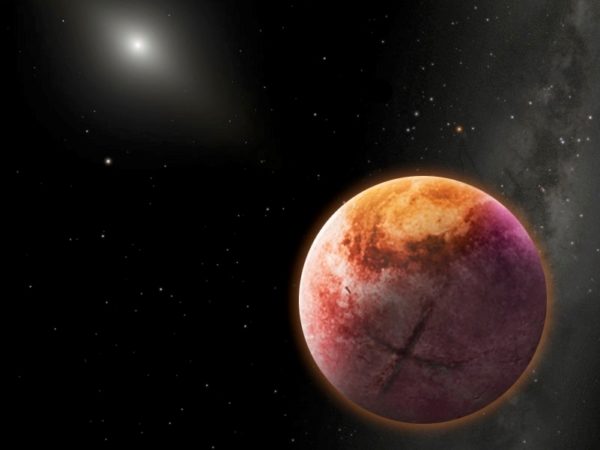

Astronomers searching the skies for evidence of a ninth planet within our Solar System believe that it’s only a matter of time before the mysterious Planet 9 is identified.
“I don’t think it’s a slam dunk; it’s not 100 percent, because it’s such low-number statistics,” says Scott Sheppard of the Carnegie Institution for Science in Washington, D.C. “But there are a lot of strange things that seem to be going on that would be explained quite well with there being some kind of massive planet out there.”
By modern day accounts, Planet 9, also known as Planet X, is thought to be hiding somewhere out beyond Pluto, with evidence for its existence so far hinging on observations of unusual movements by other so-called trans-Neptunian objects in the far reaches of the Solar System.
In 2014, Sheppard and colleague Chadwick Trujillo of Northern Arizona University announced the discovery of 2012VP113, a dwarf planet 450 km in diameter orbiting the Sun at about 452 astronomical units or AU – one AU represents the distance between the Earth and the Sun, roughly 150 million kilometres. Characteristics of VP113’s orbit tipped scientists off to the likely existence of large planet whose gravity was influencing it and other objects beyond the Kuiper belt, that icy ring of objects like comets, asteroids and the now-demoted dwarf planet Pluto.
Sheppard and Trujillo have now produced findings published in The Astronomical Journal which identify other “extreme” trans-Neptune objects whose trajectories seem to also be influenced by an as-yet unseen body, including 2013 FE72 whose orbit extends an estimated 4,000 AU at its most distant point. “I think statistics-wise, in the next year to two years we’ll probably find enough of these small, extreme objects to really say if Planet X exists or not,” says Sheppard.
The work to track down these extreme objects is time-consuming, yet with more and more outer bodies being found, the task of locating Planet 9 will get simpler. Just months ago, Canadian National Research Council astronomer J.J. Kavelaars discovered a brand new dwarf planet within the Kuiper Belt by studying data created by the Canada-France-Hawaii Telescope at Mauna Kea in Hawaii. Sheppard and his team are continuing the search, using powerful instruments such as the Subaru Telescope in Hawaii and the Cerro Tololo Inter-American Observatory in Chile. “I think we’re maybe about 80% sure there’s something else out there,” Sheppard said, “but I think we still need to find more of these smaller objects that can lead us to the bigger object.”
So far, the team reports they have covered nearly 10 per cent of the sky. “We are now in a similar situation as in the mid-19th century when Alexis Bouvard noticed Uranus’ orbital motion was peculiar, which eventually led to the discovery of Neptune,” says Sheppard.
Scientists believe that even considering its distant orbit, once the location of Planet 9 is narrowed down it may very well be visible through telescopes -the trick will be in finding exactly where in the night sky to point them.
The discovery of Planet 9 would bookend a busy decade for planet classification, as it was a full ten years ago that the International Astronomical Union (IAU) submitted its criteria for planet-hood, effectively and definitively knocking Pluto out of the realm of planets. By the IAU’s definition, a planet must be in orbit around the Sun, have sufficient mass to compress itself into a sphere and be large enough to have “cleared the neighbourhood” of other objects in its orbit. Pluto failed to meet the third criterion and was thus deemed a dwarf planet.
Leave a Reply
You must be logged in to post a comment.




 Share
Share Tweet
Tweet Share
Share




Comment